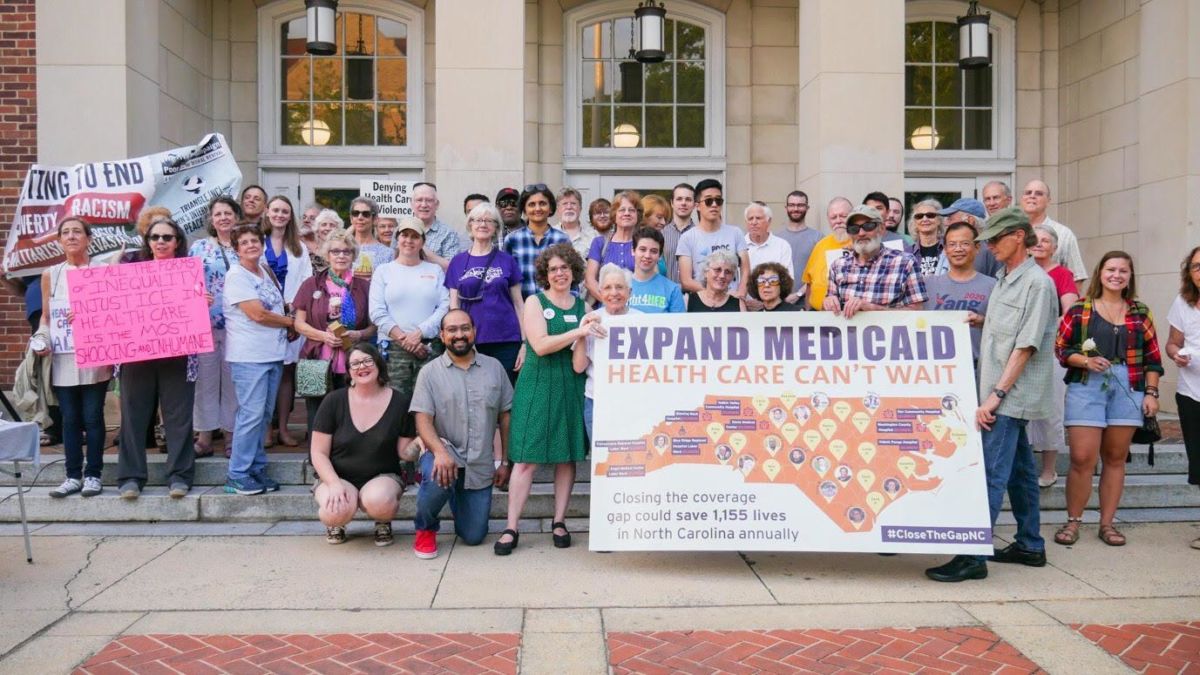North Carolina activists held 22 simultaneous vigils across the state earlier this month to remember the thousands of people who have suffered and died in the state for lack of health care and to call on Democratic Gov. Roy Cooper to veto any state budget proposal passed by the Republican legislature that does not include Medicaid expansion. A few days later, at a summit on the opioid crisis, leaders with the state Department of Health and Human Services cited expanding Medicaid as the most important step to reduce opioid addiction and deaths.
The calls show how the effort to expand Medicaid has continued in the 14 states — eight of them in the South — where Republican legislatures and governors have refused to extend health care access to more low-income people under the Affordable Care Act (ACA).
“People are dying across North Carolina each and every day we fail to expand Medicaid,” said attorney Jackie Kiger at a vigil in Asheville. “More than a thousand people die each year.”
The benefits of Medicaid expansion are extensive and well-documented: more timely treatment of Black cancer patients, decreased infant mortality rates, fewer deaths from cardiovascular conditions, more accessible treatment for opioid addictions. Still, state legislatures refused federal money to expand Medicaid, leaving 2 million people nationwide in the coverage gap, meaning they earn too much to qualify for Medicaid but not enough to qualify for ACA Marketplace premium tax credits.
And 90 percent of those in the coverage gap live in the South, where just five states have expanded Medicaid under the ACA. Arkansas was one of the first to do so when then-Gov. Mike Beebe, a Democrat, signed the state’s expansion plan into law in 2013, giving about 250,000 low-income residents access to insurance. Last year Arkansas implemented a work requirement for Medicaid recipients, but it has since been blocked twice by the federal government. Kentucky adopted its Medicaid expansion plan in January 2014 via an executive order by then-Gov. Steve Beshear, a Democrat. Like Arkansas, Kentucky attempted to implement a work requirement, but it was struck down by a federal judge. Current Gov. Matt Bevin, a Republican, has threatened to dismantle the entire expansion if Kentucky can’t impose a work requirement.
In Louisiana, current Gov. John Bel Edwards (D) expanded Medicaid via executive order on his second day in office. Since then, more than 400,000 people have enrolled in coverage under the expansion plan and more than 257,000 have received preventative care as a result. The state with the highest portion of its population enrolled in Medicaid is West Virginia, where former Gov. Earl Ray Tomblin (D) expanded the program through an executive order issued in 2013. Since then, the state’s uninsured rate has dropped from 35 percent to 14 percent and expansion is credited with helping the state address its severe opioid epidemic.
Virginia was the most recent state in the South to expand Medicaid. Though former Gov. Terry McAuliffe (D) pushed for it, he met resistance from the Republican-controlled legislature. But after voters sent more Democrats to the legislature and another Democrat to the governor’s mansion in the 2017 midterms, and those Democrats agreed to a work requirement for non-disabled recipients, the legislature passed a 2018 budget bill expanding Medicaid to up to 400,000 low-income residents. Gov. Ralph Northam signed the bill, and the law took effect this year.
That leaves the Southern states of Alabama, Florida, Georgia, Mississippi, North Carolina, South Carolina, Tennessee, and Texas without expanded Medicaid programs. But there are efforts underway in some of those states to change that.
In Florida, where 445,000 people are in the coverage gap, a group called Florida Decides Health Care has collected over 81,000 signatures in an attempt to get a Medicaid expansion initiative on the 2020 ballot. The effort is mainly funded by The Fairness Project, a Washington, D.C.-based group that uses ballot measures bypass state legislatures that refuse to act on social and economic issues. For Medicaid expansion to appear on the ballot, Florida Decides Health Care will need to collect over 766,200 signatures.
In Mississippi, where 300,000 people reside in the coverage gap and hospitals have suffered from uninsured people being unable to pay their bills, the Mississippi Hospital Association (MHA) has proposed a plan called “Mississippi Cares,” which it refers to as Medicaid “reform” and not “expansion.” Modeled after the “Healthy Indiana” plan, the program would be a partnership involving the state, its private hospitals, and Mississippi True, an MHA-created insurance company. The plan would require participants to pay a $20 monthly fee and a $100 copay for certain non-emergency hospital visits. Though Republican Gov. Phil Bryant has yet to back the plan, the MHA is hoping to win his support as well as that of other elected officials and candidates.
And as advocates press on in North Carolina, Democratic Gov. Roy Cooper has urged lawmakers to add a Medicaid expansion provision to the budget bill now being drawn up. Democratic legislative leaders have raised the possibility of a gubernatorial veto if it doesn’t. At one time such a threat wouldn’t have mattered, but the legislature is no longer controlled by a veto-proof Republican supermajority, which offers a glimmer of hope that this might be the year for expansion in the state, where over 500,000 people would benefit.
Press freedom is under attack
As Trump cracks down on political speech, independent media is increasingly necessary.
Truthout produces reporting you won’t see in the mainstream: journalism from the frontlines of global conflict, interviews with grassroots movement leaders, high-quality legal analysis and more.
Our work is possible thanks to reader support. Help Truthout catalyze change and social justice — make a tax-deductible monthly or one-time donation today.
